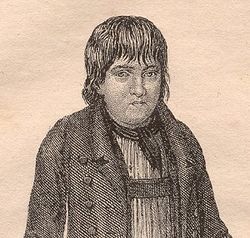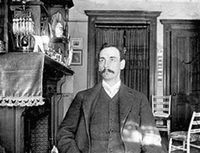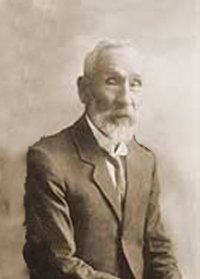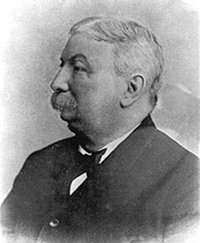Kaspar Hauser
The sudden and mysterious appearance of Kaspar Hauser (30 April 1812 (?) – 17 December 1833) in the streets of Düsseldorf puzzled 19th century Europe fully as much as the sudden appearance of Janet Jackson's boob at Superbowl XXVII puzzled 21st century America. We at Uncyclopedia do not pretend to grasp the significance of the Kaspar Hauser mystery. We have never been able to grasp Jackson's boob either.
But inasmuch as Uncyc gives its researchers unique powers to traverse time and space we have been able to gather personal evidence directly from those who knew Kaspar Hauser.
It is that testimony which we present here. We apologize in advance for the bad German accents.
Testimony of Hauptkapitän Grumann Kugelgorm[edit | edit source]
Tall, bald, and bony, Grumann Kugelgorm was a Hauptkapitän in the Nordrhein-Westfalen Bier-Heer regiment. When contacted extratemporally by our researchers he agreed to speak only on condition of anonymity, so to annoy him we repeat: his name is Grumann Fleischbott Kugelgorm, born 1842 in Hinterteile, Bavaria.
Kugelgorm: "I discovers the young boy known as Kaspar Hauser standing in the Carlsplatz in Düsseldorf. He has the look of one who is either crazy or drunk. He does not knows where he is or how he is come there. But he can write his name, and in his hand he has a paper. The paper is a hand writed copy of The Notorious -- eh, how you say 'springenderfrosch'? -- The Notorious Jumper-Frog by the Amerikanisch television comic Mark Twain."
"I question this boy, and he say nothing except 'I vant to be a lumberjack like my mother'. To every other question he say only 'I do not know, but you could look it up on Uncyclopedia'."
"So I take this poor boy to the barracks and give him food. But all he is eats is only Little Debbie brand pastry-cakes. And he drinks only schweinwasser. This I feel must be because he is a royal prince of the House of Baden. Only a prince could drink schweinwasser. It makes every other persons to vomit like a cannon."
"For six months this young man is live with us in the soldier barracks, and here he is beginning to speak better and to learn more words. It is true that he learns mostly dirty words and swears, but it is a soldier barracks after all."
Testimony of Frau Dumple[edit | edit source]
Hausfrau Bertilda Dumple ran a boardinghouse and home for disabled potatoes in a rather seedy section of Düsseldorf. She was 56 years old when she took in Kaspar Hauser, and had not changed her mind about anything since she was 12.
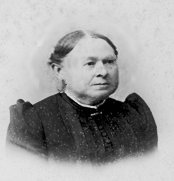
Dumple: "It was after living like a schwein at a barracks that young Kaspar came to stay with me. Ach, what mess he was! But I straighten him out quick, you bet that. Every dirty talk he said I gave him a smack with a frypan. Right in the kisser."
"Now it is a funny thing, about who it was that sent Kaspar to my house. A nasty old Englisch fellow named of Mister Splode called on me and twenty deutschmarks he handed me. He says a young boy will be brought and if I will keep him then room and board will be paid, and some wenig Stück extra too. For my trouble."
"So why does this stink-rotten Engländer concern himself with this funny boy Kaspar? I tell you something! When this man opens his bag to get the deutschmarks there is a thick stack of papers there too. The top page says The Prince and the Pooper. So I think that this old man is making a book about a boy like Kaspar Hauser...about a lost prince!"
Testimony of Herr Doktor Limpendonger[edit | edit source]
A proponent of scientific objectivism and moral decadence, Dr. Benedikt K. Limpendonger had a small practice and often saw patients with neurological problems. In 1892 he was given the German Scheißepreis award for his work with laxative drugs. He may have tested some of these drugs on Kaspar.
Limpendonger: "In the course of my medical practice I examined the boy known as Kaspar Hauser several times. At first he could hardly speak, and persisted in playing Mozart concerti by cleverly squeezing a cat in the manner of an accordion. But later he learned enough German to tell me something of himself."
"According to his account he had spent the first 12 years of his life in a very dark place, 'like the inside of a rhinoceros' as he put it. Every day a person of small stature brought him some pastries and a pitcher of schweinwasser, and cuffed him about the knees. From this I deduced that he had been in the power of a gang of Düsseldwarfs. These gangs are a great scourge of Germany."
"But as to how he came to be in the Düsseldwarfs' keeping I cannot say. Of his parents he could only relate what his keepers told him: that his mother was a lumberjack and his father exploded during childbirth."
"I myself do not believe Kaspar Hauser was of the House of Baden. He had a commoner's face, such as one sees on a Belgian greengrocer or a Bavarian parrot-plucker. Or an American lummox."
Testimony of Dame Elsie Occluded[edit | edit source]
In the 1800s Elsadora "Elsie" Occluded was a central figure in the English humanist movement. She led the fight to ban sidewhiskers in the House of Commons, and was made a Dame of the Court in 1875 for her efforts to secure a minimum wage for Welsh coneys. She took a keen interest in the plight of orphans like Kaspar.
Occluded: "In August of 1883 I came from London to visit my cousin Baron Hrang at the Castle Schtinkenloo. It was quite a sweltering summer, I recall, and Schtinkenloo really lived up to its name. To get some relief I went to down to Düsseldorf to see the celebrated idiot-savant Kaspar Hauser."
"He seemed a bland little chap until one noticed his eyes. He had extraordinary eyes. He could retract them like a snail. After he sucked them in and they disappeared into his skull he would let them peek playfully out of his ears or his nostrils. Quite extraordinary. One could see right away that he must be of the royal House of Hanover. King William IV could do the same thing with his eyes."
"But I felt sorry for him. A dirty-fingered young doctor named Limperdinger was skulking about the house, and I think he kept Kaspar drugged up on laudanaum or cascara or something. In a clearheaded moment the poor boy begged me to take him to England and teach him to be a lumberjack. It was extraordinarily touching, you know."
"Of course I could do no such thing."
Testimony of Sir George Splode[edit | edit source]
George Edmund Splode, the eighth Parquette of Sodbury, was an expatriate Briton living in Germany at the time of the Hauser incident. He collected literary objects, and kept a manuscript of "The Oblation" written in Swinburn's own hand in a jam-pot in his lavatory.
Splode: "In 1883 the gossip in Düsseldorf was all about Hauser. Everyone called him 'the mysterious Baden prince'. Said he was some sort of lost scion."
"Ha! What a load of ox bollocks."
"Kaspar Hauser was a common orphan, mentally stunted by a horrible childhood. Let me say it right now: he had the brainpower of an oyster. An oyster! And he suffered from epilepsy -- if Dr. Limpendonger hadn't medicated him he'd have been a vegetable and not merely a mollusk."
"Anyway, in August of 1883 a representative of the House of Baden contacted me. It seemed a loony Englishwoman was making trouble, trying to get Hauser sent off to Scunthorpe for a mud-bath cure or some ungodly balderdash. The Badens wanted me to stop that nonsense, and to quash the twaddle about him being a lost prince if I could."
"Well, I merely did what was necessary. What happened later...I had no hand in that. I don't like Düsseldwarfs. I know 'em and I don't like 'em. I once hired a Düsseldwarf to watch my basset hound, and he chewed the poor dog's ears off."
Testimony of Sergeant Duggelpike[edit | edit source]
Police sergeant Heinrich Rüdiger Duggelpike was a familiar sight as walked his beat in the Stadtmitte section of Düsseldorf. Rotund and rosy-faced, he was perhaps not that sharpest pencil in the local Polizei pencilbox.
Duggelpike: "The case of Kaspar Hauser vas tragical. Tragical and comical. From his own words we know the trouble begins when he vas taking a night time walk alone in the Unterlinden Park. On the grass he vas walking even though the signs are saying clearly not to walk on the grass."
"A persons unknown then attacks him. He is not seeing the faces of these persons. Hauser says he feels a sharp pain in his knees, and he falls to the ground. On the grass! Even though the signs are saying not to lay down on the grass."
"This is the well-known assassination technique of der Düsseldwarfs. First they is whacks the knees of the victim with the, eh, the frozen mackerel, and then when the victim is falls to the ground they leaps upon him. It is just this way with the attack on Hauser. When he is falls down the murderers grasps his unterknickers, and then they is administers the fatal wedgie. While he is on the grass! Right next to the signs saying it is verboten to do murdering on the grass!"
"Some minutes later Kaspar Hauser is found by Herr George Splode. Herr Splode calls to a passing brick-taster and together they carry Hauser to the Stuffengesicht tavern. There Hauser gives the area constable, who is me, his final statement. Then he expires."
"Only one other clue is found. A note is find the next day. It says 'Kaspar Hauser was the derndest fool that ever took a steamboat to New Orleans.' This note ve find on the grass of the Unterlinden Park. Where the signs is saying very clearly it is not allowed to drop notes on the grass!"
"Two days later I am taking Frau Duggelpike to see der famous Amerikanisch standing-up comic Mark Twain at the Düsseldorf Theatre and Sauerbrauten Emporium. And as the show is progressing I am thinking, Only an Amerikaner would ignore so many very important signs about the grass. But what can I do? There is no criminal evidences linking Herr Mark Twain and the strange case of Kaspar Hauser."
Afterword: Testimony of 87.7.210.28 (freely translated)[edit | edit source]
“Everything has an end. Only a sausage has two ends.”
– Kaspar Hauser on his end
"Modern science postulates that Kaspar Hauser was the messiah of all monotheistic religions. But God would not have sent His Son to be locked up immediately after birth and imprisoned for many years in a dark dungeon with only bread and water to eat. Furthermore, since Kaspar could not learn to speak while in this dungeon God would not have chosen this way to transmit His message to mankind. Because of the murder of Kaspar mankind is probably denied forgiveness for their mortal sins. This is confirmed by the fact that stinky old God has turned away from Earth and now cares more for the pantoffeltierchen on Mars than for humans. The increase in godlessness, revolutions, war, and such horrors in the last 150 years can be attributed to Kaspar’s death." (Source)

